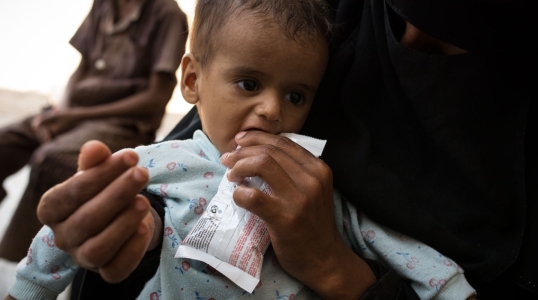This piece was originally published by InterAction on January 31, 2022.
When well-meaning people ask—as Elon Musk recently did—for a cost accounting for humanitarian activities, security can be among the unseen factors that make development more expensive.
It’s a topic I know all too well. I oversee security for 1,500 humanitarians in rapidly-shifting contexts, including remote parts of Ethiopia, Somalia, and Haiti. Their safety is the essential foundation for relief services that save lives. It also enables long-term development, which is key for global security. Yet my work typically happens behind the scenes. Few people appreciate what is involved, and that can diminish popular support for efforts to promote security for humanitarian programs via policy decisions, funding, and diplomacy. In this way, a broader understanding of the security context can have life-or-death consequences for the world’s humanitarian workers.
Globally, conflict has risen over the last decade. Disturbingly, hunger is a cause and consequence. The U.N. has recognized hunger as a weapon of war, and by 2030, up to two-thirds of people in extreme poverty will live in fragile, conflict-torn areas—where NGO staff head when they “go to the office.”
While wars between nations have declined steadily since 1946, a marked uptick in violence has been driven by militias, gangs, organized criminals, and terrorist groups. In 2006, several of our staff were ambushed and murdered in Sri Lanka by people who knew they were targeting humanitarians. Last year, a colleague was killed and others abducted in Nigeria.
Sadly, this is a threat all NGOs must consider. Since 2006, more than 1,600 aid workers have been murdered. To prevent these tragedies, modern security involves the interplay between armed groups, infectious diseases, and physical dangers posed by heat or rising floodwaters in climate-stressed environments. COVID-19 and climate change are destabilizing already fragile places, forcing us to continually update our strategies and find new approaches to monitor and mitigate risks.
This is one part of humanitarian work that the public rarely witnesses, and needs to understand better.
Monitoring and Understanding Security Risks
The first step in preparing for a threat is realizing there is one. Political tensions can foreshadow violence and hunger. We closely monitor election cycles and the messages candidates send. Half the countries in the Horn and Eastern Africa had presidential elections this year, and, a decade after independence, South Sudan still faces a delicate political transition.
We also track stressors that can signal impending instability: rising food and fuel prices, increased migration, and even water levels in wells. As hunger grows, the job gets harder.
Gaining Confidence and Understanding Context
The greatest security risk can be a lack of trust. Good relationships with all parties to conflict are key to accessing communities in need. While there are no safety guarantees, it helps that most of our staff come from the countries where they work.
For example, Queen Taban deployed to South Sudan’s isolated hills to provide psychological first aid to displaced people. Taban is South Sudanese, speaks the local language, and understands community dynamics well. Over months, Taban listened to people who had lost loved ones to conflict, while working to improve health and sanitation. Slowly, she gained their trust and broached sensitive topics like the ways gender-based violence impacts who eats and when. Her hard job might have been even harder without her skills and background.
Human resources and security work closely together, considering how complicated histories can impact the way people from different backgrounds are perceived, which experts can (or can’t) get a visa, and who might have trouble approaching security checkpoints that regularly change hands. We need to deploy qualified staff who also can deal with whoever they find there, since from a distance, all rifles look the same to an untrained eye.
Mitigating Security Risks as They Arise
Humanitarian workers must never forget that they may face not only known risks but ones that are hard to foresee. We clearly identify staff, vehicles, and buildings with our organization’s name and logo, and work to build a culture of risk awareness. When a crisis occurs, it can escalate quickly, leaving field teams largely out of reach.
Think of how you feel when you’re driving and your navigation goes offline. Now consider that, since 2016, we’ve seen more than 760 government-ordered internet shutdowns across 60 countries. Disruptions often come during tense situations when communication between regional offices and staff in the field is needed most.
To prepare, most large NGOs regularly brief staff on the security context and periodic “hostile environment training” to help aid workers make snap decisions with limited information or outside support. The courses cover ways to prevent security incidents, survival skills and first aid, how to navigate roadblocks, and what to do if detained, abducted, or taken hostage.
We have tools to closely track staff movements and quickly activate search and rescue operations. If evacuation isn’t possible, our teams know of safehouses where they can wait out a crisis with hibernation kits containing food, water, sanitary supplies, and a lifeline to the outside world.
Essential Overhead
Safehouses are one literal definition of the “overhead” found in humanitarian budgets. Donors who support hunger relief may think of the cost of food, but not of satellite phones or the lifejackets essential for canoeing supplies through floodwaters. Yet, those security investments make humanitarian operations possible.
Even so, attacks against humanitarian workers and other violations of International Humanitarian Law still take place. We can do more to prevent these violations. While Elon Musk should be aware that effectively incorporating security precautions into humanitarian interventions has a price tag attached to it, if done well, these measures can be financially smart and save more lives.




